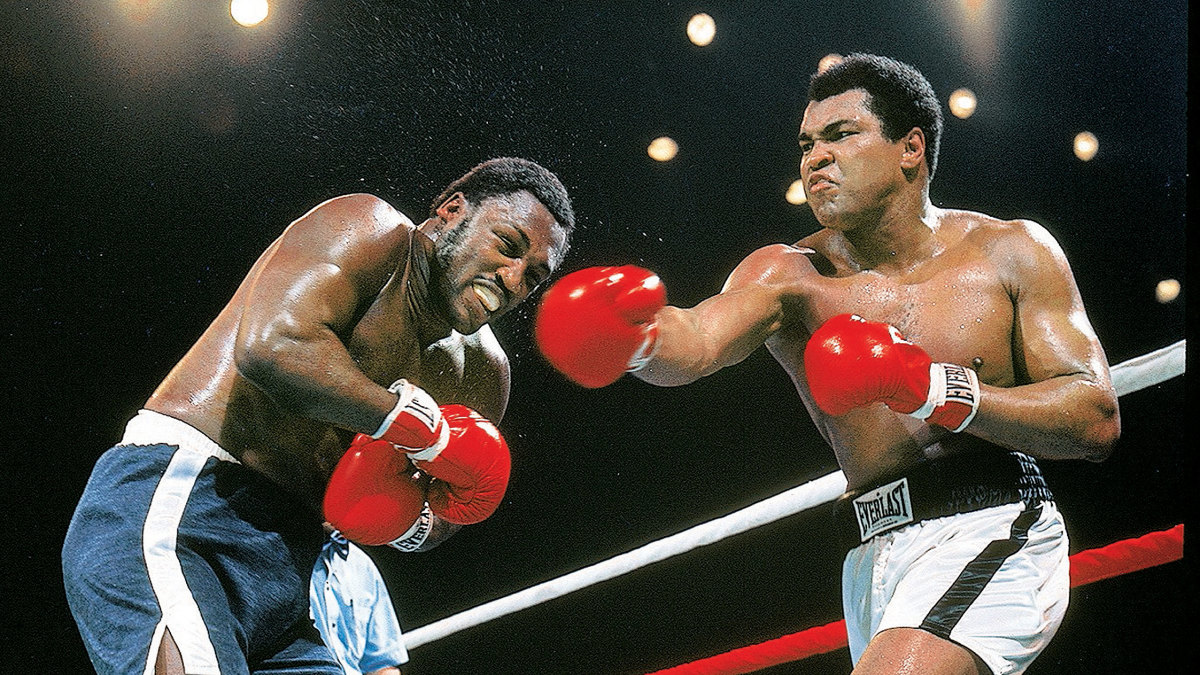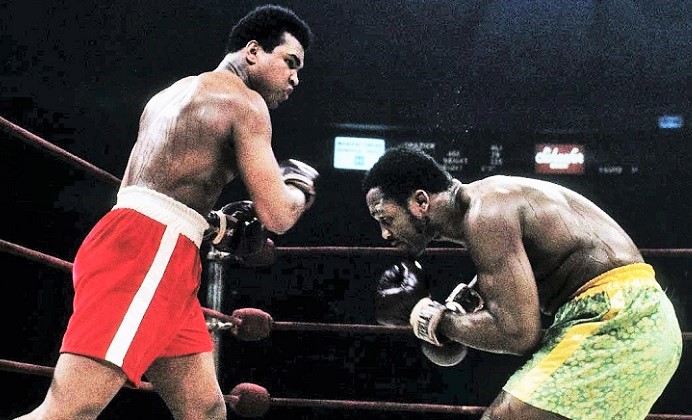
Fact-Checking ‘Fight Night’: The True Story of Muhammad Ali and a Million-Dollar Heist

Muhammad Ali called Oct. 26, 1970, his “day of judgment.” His refusal to be inducted to the Army during the Vietnam War, on moral and religious grounds, had pushed him out of the ring for 43 months. But that night in Atlanta, his boxing license restored, he faced “The Great White Hope” Jerry Quarry in his long-awaited return to the ring. Black royalty from Harlem to Birmingham showed up and showed out: Diana Ross, Sidney Poitier, Hank Aaron, and Corretta Scott King filled ringside seats. Filling the stands right alongside them were a bevy of gangsters, pimps, drug dealers, and ordinary boxing fans, decked in silk shirts unbuttoned to the navel, four-inch platform shoes, ankle-length mink coats, mink fedoras, and mink bowties.
But the historic fight was largely overshadowed by one of the most brazen robberies to ever hit Atlanta. The heist took place at an invite-only house party following the bout, where guests were forced to disrobe, hand over their jewelry, cash, and other valuables, and lie like sardines in the home’s basement until the assailants escaped the next morning. Peacock’s Fight Night: The Million Dollar Heist, created by Shaye Ogbonna-created (The Chi) tells the wild tale through the lens of party host Gordon “Chicken Man” Williams, played by a boisterous, bullet-dodging Kevin Hart. Don Cheadle co-stars as J.D. Hudson, one of the first Black detectives in Atlanta’s police force, who was also part of Ali’s security detail; Samuel L. Jackson as Atlanta crime boss Frank Moten; Terrence Howard as Jersey mafioso Cadillac Richie; and Taraji P. Henson as a mistress to Chicken Man. Though the series is loosely adapted from the 2020 true-crime podcast of the same name — or, as a chyron at the start of the first episode puts it, “based on some shit that really happened” — as with any adaptation, many plot lines are dramatized and some new characters take center stage.

To help you separate truth from fiction, here are some key facts of the real-life story, versus how it’s presented in the series.
Why was Ali’s Atlanta fight such a big deal?
The October fight marked Ali’s return to the ring after a three-year suspension for draft evasion. Ali was banned from stepping into a U.S. boxing ring, with the then California Gov. Ronald Reagan, saying “That draft dodger will never fight in my state, period,” but with the help of Georgia Senator Leroy Johnson, played as smooth talker in Fight Night by RonReaco Lee, Atlanta granted Ali a boxing license.
The fight also occurred at a turning point in Atlanta, as the constant drumbeat of civil rights activism had led to the crumbling of racial barriers in the South. As the series accurately presents, detective J.D. Hudson, one of the first Black detectives in Atlanta’s desegregated police force, was tasked with protecting Ali for this high-profile event, guarding him 24 hours a day from the cottage where Ali was staying outside the city to his walk to the ring. The series somewhat downplays the real-life danger: In the show, men in a truck wagging a confederate flag egg Ali’s lodge. In actuality, someone shot at the cottage every night, according to Ali’s physician, Dr. Ferdie Pacheco. The gunshots forced the inhabitants to congregate at the back of the house, Pacheco shared in the oral history Knockout: Muhammad Ali, Atlanta, and The Fight Nobody Wanted by David Davis.

What went down at the fight?
Similar to the series, it was a true see-and-be-seen event. Ali himself dressed to the nines in a white, double-breasted suit and a wide-brimmed hat, according to Jonathan Eig’s 2017 biography Ali. Boxing historian Bert Sugar called the event “the greatest collection of Black money and Black power ever assembled until that time.”
2
After three rounds, Ali’s jabs and combinations resulted in a bloody cut above Quarry’s eye, ending the match, with Ali declared the winner. As a March 1971 Rolling Stone cover story on Ali describes: “So Muhammad hit him often, until he didn’t exactly drop but was slowed down to a blundering stumble and they stopped it.”
Who was behind the party?
The series makes it seem like Chicken Man — a real person described in a 1970 Atlanta Journal article as an “Atlanta lottery kingpin” — hustled his way into hosting the party. Touting it as a “Black Vegas,” Hart’s character calls up fictional heavy hitters in organized crime to attend, including Detroit’s “Mushmouth” (Clifton Powell), Chicago’s Bunker Willis (Dammon Earl Hughes), “Tex” (self-explanatory; played by Exie Booker), and Kansas City’s “Missouri Slim” (David Banner). In reality, according to the 2020 Fight Night podcast, the original party host, “Fireball,” whose name was printed on the invitations, asked Chicken Man to take over hosting duties.
What really happened at the party?
In Fight Night, Chicken Man is thrown in the back of a car and held at gunpoint by two gangsters, Frank and Cadillac, before he even arrives at the party. This is made up. The real Chicken Man left the fight around 1 a.m. and arrived at the party with Fireball. What happens next in the series lines up pretty closely with the truth: Attendees are met by masked men with shotguns, escorted to the basement, and told to strip and then dump their jewelry and cash onto the floor. The valuables, which totaled around $1 million, were swept with a broom into pillowcases. Once the basement reached capacity, partygoers were forced to lie on top of each other stacked like “cordwood to conserve space,” as described in the Atlanta Journal article.

What the series fails to include is that Ali himself was among the people found in the basement, as Eig reports in his biography. Ali’s confidante, Gene Kilroy, even got a call afterward from Ali’s dad asking him to bring the fighter something to put on, since the robbers had confiscated his clothes, according to Knockout.
“They were robbing some very influential and dangerous people — not just the members of the Nation of Islam, but people who were not going to take this lying down,” Eig tells Rolling Stone.
Who were the robbers?
Early on, the police suspected Chicken Man, the party host and owner of the house where it took place, orchestrated the whole heist. Chicken Man denied involvement, in an Atlanta Journal report.

McKinley Rogers Jr. (portrayed in the series by Sinqua Walls), James Henry Hall, and Houston J. Hammonds were later named in an indictment, the Atlanta Journal reported on Nov. 18, 1970. Hammonds was arrested after officers discovered a sawed-off shotgun registered to his name near the scene. Rogers Jr.and Hall were indicted in the case but later found dead in a pool hall in the Bronx, the New York Times reported in May 1971. “We said last fall it was just a question of who caught up with them first – the police or the victims,” detective Hudson said to the Times. “It appears the victims got there first.”
Where is Chicken Man today?
Chicken Man dances with death throughout the series — he’s held at gunpoint twice by Frank in the first two episodes. In fact, the New York Times reported that Chicken Man was killed days after the robbery as payback for his suspected crimes. But Detective Hudson, who died in 2009, revealed in an interview aired in the Fight Night podcast that Chicken Man survived the heist, left organized crime, and became a pastor in an Atlanta church before his death in 2014.
Leave a Reply